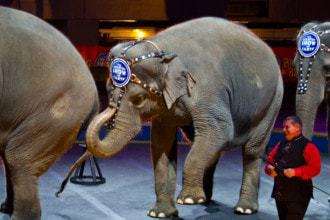
Dear EarthTalk: Why did Ringling Brothers stop using elephants in its circus performances?
— Marianne Lusko, Bern, NC
After enduring years of criticism from animal rights activists, Feld Entertainment, the parent company of Ringling Bros. and Barnum & Bailey, announced in March 2015 that it would phase out the use of endangered Asian elephants in its circus performances within three years. Then, less than a year later, the company said it was expediting the process and would be retiring the 11 elephants still travelling for circus shows even earlier—by May 2016.
These last working circus pachyderms are now able to join 31 of their predecessors at the Center for Elephant Conservation, a 200-acre elephant refuge in central Florida created by Ringling Bros. in 1995 to care for, conserve, breed and study Asian elephants.
“There’s been somewhat of a mood shift among our consumers,” says Alana Feld, the company’s executive vice president. “A lot of people aren’t comfortable with us touring with our elephants.”
No doubt, part of the reason for that mood shift has been the advocacy work of groups like the American Society for the Prevention of Cruelty to Animals (ASPCA), the Humane Society of the United States (HSUS) and People for the Ethical Treatment of Animals (PETA)—each which has campaigned tirelessly to halt the use of Asian elephants in America’s iconic circus act. Testimonials from former circus employees and photographic evidence provided by these groups helped convince the U.S. Department of Agriculture to fine Ringling Bros. $270,000 in 2011 for violations of the Animal Welfare Act.
Some of the documented abuses include Ringling Bros. elephants getting whipped and beaten by trainers and “yanked by heavy, sharp steel-tipped bull hooks behind the scenes, prior to performing.” A PETA investigator who travelled with Ringling Bros. for several months documented many of the circus’ elephants swaying and rocking continuously—“neurotic and abnormal behavior typically seen in animals who are suffering from extreme stress, frustration, and boredom.” Meanwhile, baby elephants were “torn away from their mothers and subjected to violent training sessions [to] learn how to perform tricks.” PETA adds that at least 30 elephants, including four babies, have died prematurely from accidents or disease while travelling with Ringling Bros. since 1992.
While circus fans will certainly miss the elephants’ presence in the ring heralding the opening of each show and performing synchronized dance routines, they’ll be glad to know that these lovable and endangered animals will no longer suffer abuse or be exploited for their entertainment value.
That said, Ringling Bros. does continue to use lions, tigers, zebras, llamas, goats, horses, camels and dogs in its circus performances—a fact that animal rights activists remain unhappy about. For its part, PETA wants Ringling Bros. to pull all of its animals from their performances immediately.
“Tigers and lions spend most of their lives in cramped transport cages,” the group reports, adding that these and other animals travelling with the circus “are denied everything that is natural and important to them.”
CONTACTS: Ringling Bros., www.ringling.com; Center for Elephant Conservation, www.ringlingelephantcenter.com; PETA, www.peta.org; HSUS, www.hsus.org; ASPCA, www.aspca.org.
EarthTalk® is produced by Roddy Scheer & Doug Moss and is a registered trademark of the nonprofit Earth Action Network. To donate, visit www.earthtalk.org. Send questions to: question@earthtalk.org.

